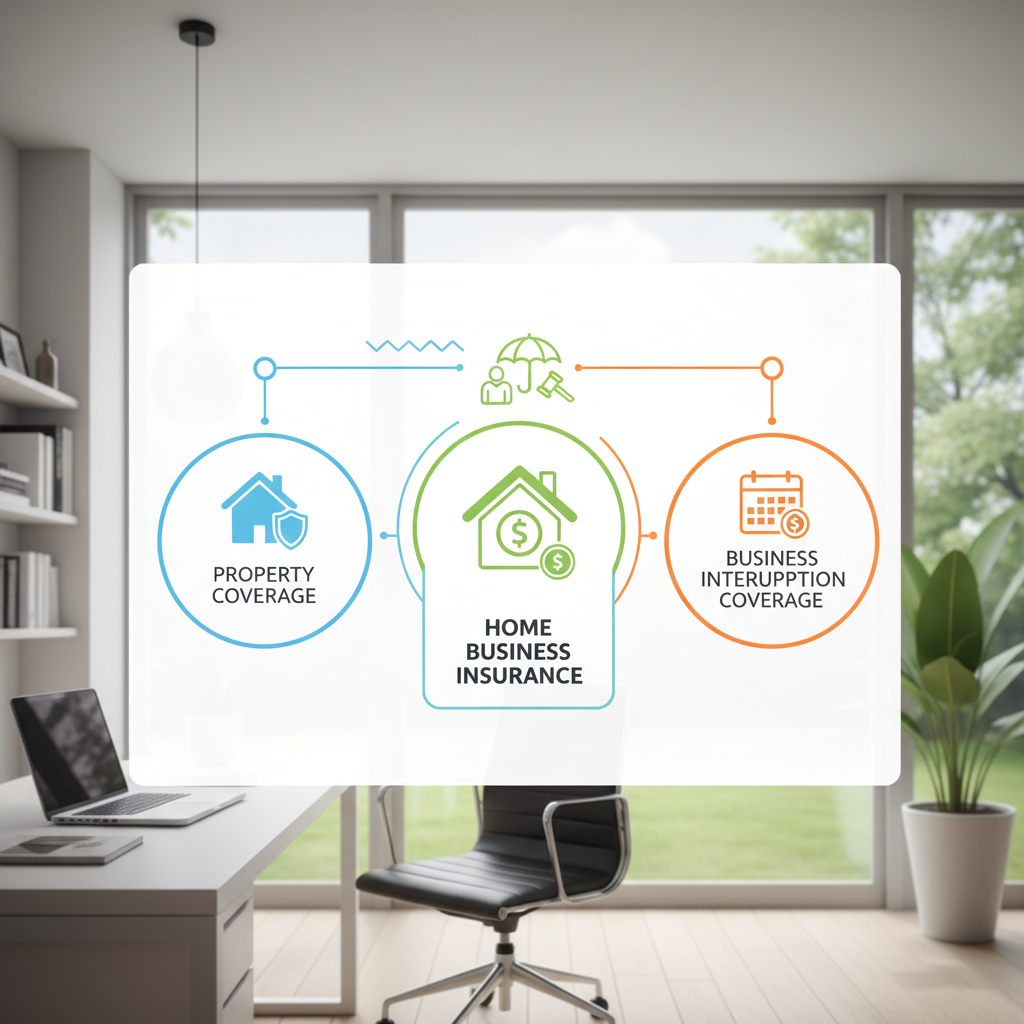
Table of Contents
Introduction
Imagine running a successful business from the comfort of your own home, managing everything from your laptop while enjoying the flexibility and freedom that comes with being your own boss. However, despite these advantages, operating a home-based business comes with unique risks that can jeopardize your livelihood if you aren’t adequately protected. Have you ever wondered what would happen if a sudden mishap damaged your equipment or if a client slipped and got injured on your property? These scenarios highlight why insurance specifically tailored for home-based businesses is not just a luxury but a critical necessity.
In today’s evolving economy, more entrepreneurs are choosing to operate their businesses from home, whether it’s freelancing, consulting, crafting, or running an online store. According to recent surveys, nearly 50% of small businesses in the U.S. are home-based, underscoring the importance of understanding how to protect this growing segment of the workforce. Despite this trend, many home business owners mistakenly rely on their standard homeowners insurance, which often excludes business-related claims. This gap in coverage can lead to significant financial loss, making specialized insurance for home-based businesses essential to ensuring peace of mind and long-term success.
Running a business from home merges your personal and professional worlds, which complicates your insurance needs. Standard homeowners insurance policies are designed primarily to protect your family and your residence, not your business assets or liabilities. For example, while your laptop used for running your shop might be covered for theft or damage under a homeowners policy, expensive business equipment such as inventory or specialized tools often fall outside this protection. This leaves your valuable business property vulnerable to risk, emphasizing why dedicated business insurance is crucial for entrepreneurs working out of their homes.
Addressing risks early is a proactive approach that can save you from devastating setbacks later. Many home-based business owners do not realize that even seemingly minor incidents, like a visitor tripping over equipment or data breaches from handling sensitive client information, can result in costly legal claims or loss of reputation. By understanding the right kind of insurance coverage, you empower yourself to navigate these risks confidently. Exploring insurance basics helps establish a strong foundation for making informed decisions about what policies suit your specific business needs best.
What You’ll Learn in This Guide
This guide will take you on a comprehensive journey through the essentials of insurance tailored for home-based businesses. You’ll gain clarity on the types of coverage available, why each matters, and practical advice on selecting the right protection for your unique business setup.
- Understanding the Basics: You’ll learn what insurance for home-based businesses entails, including how it differs from regular homeowners insurance. This section will clarify why specialized coverage is needed to fully protect your business assets and operations.
- Types of Coverage: Discover the various insurance options such as business property coverage, liability insurance, and business interruption insurance. Each type addresses different risks, helping you safeguard your equipment, legal responsibility, and income stability.
- Choosing the Right Insurance: Navigate the process of assessing your business risks, comparing coverage options and costs, and evaluating insurance providers. This part will equip you with the criteria to make smart decisions aligned with your budget and business goals.
- Common Claims and Prevention: Learn about typical claims made by home-based businesses, such as equipment damage or liability issues, and effective strategies to avoid them. This knowledge will help you minimize risks and reduce insurance costs over time.
As we delve deeper into this article, we’ll explore each of these areas in detail, providing actionable insights and examples to illustrate key points. From understanding how business insurance complements homeowners insurance to tips on managing cybersecurity risks, this guide is designed to be your go-to resource. Whether you’re just starting or have been running your home business for years, the information here will enhance your confidence in protecting what you’ve built.
By the end of this article, you will not only grasp the importance of tailored insurance coverage but also feel prepared to take the necessary steps to secure your business. The right insurance protects your financial future and helps you focus on growing your business without constant worry. So, let’s get started by breaking down what insurance for home-based businesses really means and why it’s a vital part of your entrepreneurial toolkit.
Understanding insurance for home-based businesses is the cornerstone of long-term success and stability. Many people also wonder about types of insurance, which plays a crucial role in determining what specific coverage suits different business models. We’ll cover multiple insurance types and highlight the distinctions so you can make an educated choice. Taking this proactive approach ensures you avoid costly pitfalls and interruptions down the road.

For many entrepreneurs, operating a home-based business offers unparalleled convenience and cost savings. However, these benefits come with unique challenges, especially when it comes to protecting your venture from unforeseen risks. While a standard homeowners insurance policy might cover some aspects of your property, it often falls short when it comes to business-related liabilities and losses. This gap makes specialized insurance for home-based businesses a necessity rather than a luxury. Understanding the nuances of these policies and how they differ from standard home coverage is essential for securing your business’s future and safeguarding your assets.
Essential Types of Coverage for Home-Based Businesses
Having the right insurance coverage tailored specifically for your home-based business is critical to managing risks effectively. Unlike regular home insurance, which typically excludes business activities, specialized policies address the unique exposures that arise from running a commercial enterprise in a residential setting. These policies cover a range of protections designed not only to safeguard your physical assets but also to shield you from legal and financial liabilities. Many people underestimate the need for specialized coverage until an incident forces them to face costly consequences. By choosing suitable coverage options, you can protect your business equipment, address potential liabilities, and mitigate financial losses from interruptions.
Expanding on these fundamentals, it’s valuable to know key insurance types commonly sought by home-based entrepreneurs. Some of these include business property coverage, liability insurance, business interruption policies, and professional liability coverage. Recognizing what each insurance type covers will help you tailor your policy to your specific business operations and risk profile. To fully grasp this concept, it helps to understand the essential types of insurance that provide comprehensive protection for different business needs.
Key Aspects of Coverage for Home-Based Businesses
Here are some of the primary types of insurance coverage that home-based businesses should consider to build a robust protection plan:
- Business Property Coverage: This protects your business equipment, inventory, and supplies against risks such as fire, theft, or natural disasters. For example, if your essential electronics or products are damaged in a flood, this coverage helps with repair or replacement costs, ensuring your business can rebound quickly.
- Liability Insurance: Legal responsibility for injuries or damages linked to your business activities can lead to costly lawsuits. Liability insurance provides financial protection in the event clients or visitors face injury or property damage due to your business operations.
- Business Interruption Insurance: Interruptions caused by covered perils—like fire or natural events—can halt your business operations and income stream. This insurance compensates for lost income during the downtime, helping you maintain financial stability while you recover.
- Professional Liability Insurance: Also known as errors and omissions insurance, this is vital for service-oriented businesses. It protects against claims stemming from negligence, mistakes, or failure to perform professional duties as promised.
Evaluating and Choosing the Right Insurance for Your Home-Based Business
Choosing the right insurance involves more than picking a policy off the shelf. It requires a thoughtful evaluation of your business risks, the costs of coverage, and the reputation of insurance providers. Each home-based business is unique, so understanding your specific exposures is the first step toward finding a policy that offers comprehensive protection without unnecessary expenditures. This process also includes reviewing insurance terms carefully and comparing multiple quotes. The aim is to achieve an optimal balance between affordable premiums and essential coverage, enabling you to protect your venture effectively without overpaying.
In addition, investigating the insurance provider’s customer service record and claims handling efficiency is crucial. Reliable support can ease the often complex and stressful processes of filing claims or understanding policy details. Many entrepreneurs find that consulting with insurance agents or leveraging resources enhances their ability to make well-informed decisions. For a detailed breakdown of this step, see our guide on understanding the insurance claims process, which helps ensure you’re prepared when it comes time to file a claim.
Important Considerations When Choosing Insurance
When evaluating your options for home-based business insurance, keep these important considerations in mind:
- Assess Your Risks: Identify the unique risks your business faces. For instance, a home-based bakery will have different concerns than a freelance graphic design service. Understanding these risks helps tailor your coverage accordingly and prevents gaps in protection.
- Compare Coverage and Costs: It’s important to strike a balance between adequate coverage and affordable premiums. Sometimes paying slightly more for comprehensive protection can save you from significant out-of-pocket expenses down the line.
- Check Provider Reputation: Research insurers’ customer reviews and their claims handling record. Reliable service and prompt, fair claim settlements are essential qualities in an insurer to support your business effectively.
- Policy Exclusions and Endorsements: Review what is not covered under policies and whether endorsements or riders are available to expand coverage. Some insurers offer add-ons specifically designed for home-based businesses that address gaps in standard homeowners insurance.

Conclusion
Understanding insurance for home-based businesses is essential for safeguarding your entrepreneurial venture against the unique risks that come with operating from home. Unlike standard homeowners insurance, which typically excludes business-related claims, specialized insurance policies provide comprehensive coverage tailored to your business needs. This includes protection for business property such as equipment and inventory, liability coverage for potential injuries or damages, business interruption insurance to compensate for lost income, and professional liability insurance against claims of negligence. Recognizing these distinctions ensures you are adequately protected and can avoid costly surprises in the event of an incident.
Home-based businesses face distinct challenges and exposures that can impact both personal and professional realms. From unforeseen equipment damage to liability claims or data breaches when handling sensitive client information, the stakes are high. Without the proper insurance, these risks can lead to devastating financial setbacks and disruption of business operations. As the home business landscape grows, so does the need for proactive risk management through the right insurance coverage. This proactive approach is a cornerstone of sustaining your business and preserving your peace of mind.
When choosing insurance for your home-based business, start by assessing your specific risks and identifying the coverage types that align with your operations. Compare policies carefully, balancing adequate protection with affordability. Verify the reputation and reliability of insurance providers, paying close attention to customer reviews and claims handling. Being educated about your options empowers you to make informed decisions that align with your long-term business goals. For further foundational understanding, exploring insurance basics and types of insurance can provide valuable insights that complement your knowledge.
In practical terms, protect your business assets by maintaining your equipment and securing sensitive data to reduce claims. Implement safety practices to minimize liability risks associated with client interactions at your home. Stay vigilant about cybersecurity to prevent potential data breaches that could lead to costly claims. Regularly reviewing your insurance coverage ensures it remains aligned with evolving risks and business growth. Taking these actionable steps strengthens your defense, reduces insurance costs, and enhances your business resilience.
Securing the right insurance for your home-based business is a vital investment that protects your financial future and supports your entrepreneurial aspirations. By understanding the intricacies of specialized coverage and taking informed action, you empower yourself to face uncertainties with confidence. Remember, the peace of mind gained from appropriate insurance coverage lets you focus on growing your business, not worrying about potential setbacks. For further reading and continued learning, consider diving deeper into related insurance topics to broaden your understanding and keep your business protected.


